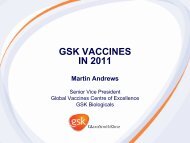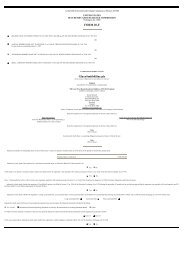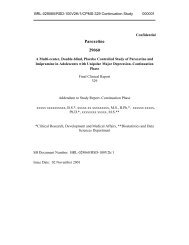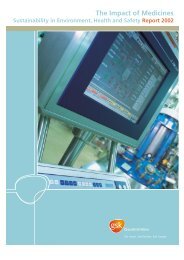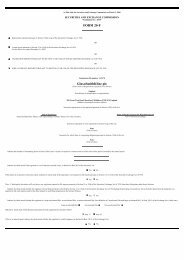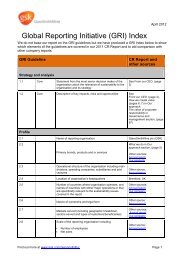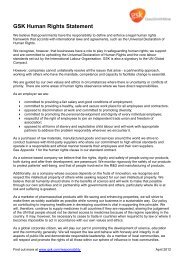GSK Annual Report 2002
GSK Annual Report 2002
GSK Annual Report 2002
You also want an ePaper? Increase the reach of your titles
YUMPU automatically turns print PDFs into web optimized ePapers that Google loves.
58 GlaxoSmithKline Operating and financial review and prospects<br />
<strong>2002</strong> 2001<br />
Net interest payable £m £m<br />
Interest payable (206) (198)<br />
Investment income 73 129<br />
(133) (69)<br />
Share of interest payable of associate (8) (19)<br />
(141) (88)<br />
Net interest payable increased compared with 2001 largely as a<br />
result of a higher average level of net debt driven by the use of cash<br />
to fund the Group’s share buy-back programme. The benefit of a<br />
smaller number of shares in issue is reflected in earnings per share.<br />
Profit on ordinary activities before taxation<br />
Other operating income/(expense), together with the disposal of<br />
part of the interest in an associate in 2001, reduced profit by<br />
£111 million in <strong>2002</strong>, but added £133 million to profit in 2001.<br />
Taking account of the contribution from associates and net interest<br />
payable, business performance profit before tax was £6,517 million,<br />
compared with £6,169 million in 2001, an increase of 11 per cent.<br />
Merger items, restructuring costs and disposal of businesses<br />
The key items in <strong>2002</strong> are discussed below.<br />
Merger and Manufacturing restructuring<br />
GlaxoSmithKline has made good progress with its merger and<br />
manufacturing restructuring plans and remains on track to deliver<br />
forecast total annual merger and manufacturing restructuring<br />
savings of £1.8 billion by 2003, excluding benefits from the Block<br />
Drug acquisition. The estimated cost of achieving this remains<br />
around £3.8 billion, of which £3.4 billion had been charged by<br />
31st December <strong>2002</strong>.<br />
Costs of £972 million were incurred in the year in respect of merger<br />
and manufacturing restructuring. After tax relief of £249 million,<br />
the net charge was £723 million. The costs in <strong>2002</strong> include<br />
severance, asset write-downs, professional fees and site closure.<br />
Block Drug Company, Inc.<br />
GlaxoSmithKline acquired Block Drug in January 2001. The costs<br />
incurred in integrating this business were £60 million in <strong>2002</strong><br />
including redundancies, asset write-downs and site closures.<br />
Disposal of businesses<br />
The profit on disposal of businesses in <strong>2002</strong> of £21 million reflects<br />
the final settlements regarding merger related product disposals<br />
and the disposal of the Healthcare Services businesses in 1999.<br />
Trading profit – Statutory<br />
<strong>2002</strong> 2001<br />
£m % £m % CER% £%<br />
Sales 21,212 100 20,489 100 7 4<br />
Cost of sales (4,609) (21.7) (4,733) (23.1) – (3)<br />
Selling, general<br />
and administration (8,041) (37.9) (8,408) (41.1) (1) (4)<br />
Research and<br />
development (2,900) (13.7) (2,651) (12.9) 12 9<br />
Trading profit 5,662 26.7 4,697 22.9 26 21<br />
Statutory results, which include merger items, integration and<br />
restructuring costs, and the disposal of subsidiaries delivered<br />
trading profit of £5,662 million on sales of £21,212 million.<br />
Taxation 2001<br />
<strong>2002</strong> (restated)<br />
£m £m<br />
Business performance (1,760) (1,655)<br />
Merger, restructuring and disposal<br />
of subsidiaries 299 322<br />
(1,461) (1,333)<br />
Business performance taxation<br />
The charge for taxation on business performance profit of<br />
£1,760 million represents an effective tax rate of 27.0 per cent.<br />
This represents an increase compared with the effective rate for<br />
2001 which was 26.8 per cent, as restated for the implementation<br />
of FRS 19 ‘Deferred Tax’.<br />
The integrated nature of the Group’s worldwide operations, involving<br />
significant investment in research and strategic manufacture at a<br />
limited number of locations, with consequential cross-border supply<br />
routes into numerous end-markets, gives rise to complexity and<br />
delay in negotiations with revenue authorities as to the profits on<br />
which individual Group companies are liable to tax. Disagreements<br />
with, and between, revenue authorities as to intra-Group<br />
transactions, in particular the price at which goods should be<br />
transferred between Group companies in different tax jurisdictions<br />
can produce conflicting claims from revenue authorities as to the<br />
profits that fall to be taxed in individual territories. Resolution of<br />
such issues is a continuing fact-of-life for GlaxoSmithKline.<br />
In the USA, for a number of years, GlaxoSmithKline has had<br />
significant open issues relating to transfer pricing. These issues<br />
affect all years from 1989 to the present and concern a number of<br />
products, although the most significant relates to the success of<br />
Zantac, in respect of which the claims of the US Internal Revenue<br />
Service (IRS) substantially exceed the Group’s estimation of its<br />
taxation liabilities. The IRS claims, which are not completely<br />
quantified, continue to be the subject of discussions between the<br />
US and UK tax authorities under the competent authority provisions<br />
of the double tax convention between the two countries.<br />
Within these discussions there is a wide variation between the views<br />
of the US and UK tax authorities and, exceptionally, they may be<br />
unable to reach agreement to settle the dispute. In the event of the<br />
UK and US tax authorities not reaching agreement, the matter may<br />
have to be resolved by litigation.<br />
GlaxoSmithKline uses the best advice in determining its transfer<br />
pricing methodology and in seeking to manage transfer pricing<br />
issues to a satisfactory conclusion and, on the basis of external<br />
professional advice, continues to believe that it has made adequate<br />
provision for the liabilities likely to arise from open assessments.<br />
The Group has implemented the new Financial <strong>Report</strong>ing Standard,<br />
FRS 19 ‘Deferred tax’, in <strong>2002</strong>, which requires deferred tax to be<br />
accounted for on a full provision basis rather than a partial provision<br />
basis as before. For the full year 2001 the business performance tax<br />
charge is increased by £8 million, and the overall tax charge by<br />
£6 million. The net deferred tax asset at 31st December 2001 has<br />
been reduced by £127 million.<br />
Merger and restructuring<br />
The credit for taxation on merger and restructuring items<br />
amounting to £299 million reflects the estimated actual tax rate<br />
applicable to the transactions in the territories in which they arise.



